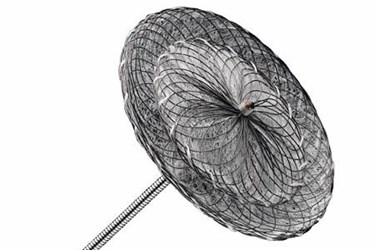FDA Panel Votes 15-1 To Approve St. Jude's Stroke Prevention Device

An FDA panel has issued the green light for St. Jude’s Aplatzer PFO Occluder device, saying studies of the device showed “reasonable assurance” that the device was safe for use. The implant, which is intended to prevent recurrent ischemic strokes in patients with patent foramen ovale (PFO), has been the subject of controversy for decades, and the panel’s decision represents a major milestone for the technology, said St. Jude executives.
PFO occurs when an opening between the two upper chambers of the heart that usually closes during infancy remains open. Though the condition is relatively rare and most people who have it never know it, it is common among patients who experience unexplained stroke. According to the Mayo Clinic, the link between PFO and ischemic strokes has not been definitively established.
Patients with PFO who have suffered strokes are usually treated with a lifetime course of blood thinners, but researchers have been working for years to develop a device that could close the hole and reduce risk surgically. Larry Biegelson, a Wells Fargo analyst, told the Star Tribune that PFO-closure devices were “one of the most controversial areas of cardiovascular devices/medicine over the past 10+ years, with strong proponents and equally strong critics.”
Though some on the FDA panel expressed their concern with the device, the panel voted 15-1 that studies showed “reasonable assurance” that the device was safe, 11-5 that benefits outweighed the device’s risks, and 9-7 that the device was effective for its intended use, according to TCTMD.
To make their decision, expert panelists studied data from a the RESPECT trial, which followed 980 patients for 5 years each, with half implanted with the device and the other half following the traditional drug regimen alone. Because PFO is so rare, it took 8 years to enroll a sufficient number of patients, and the trial took a total of 13 years to complete.
Several panel experts who voted against the device cited missing data and questionable methodology among their concerns. Seemant Chaturvedi, a neurologist from the University of Miami School of Medicine, voted “no” three times, reported Cardiology Today.
“We are in a world of evidence-based medicine and two trials have shown the primary endpoint was not met,” said Chaturvedi.
According to St. Jude, studies of the device demonstrated a 54 percent risk reduction in recurrent stroke with the Aplatzer versus medical management, and 4.5 percent of patients implanted with the device experienced an adverse event related to the procedure. John Caroll, lead researcher on the RESPECT trial, told Cardiology Today’s Intervention that “the really extensive amount of new data” demonstrated the occluder’s superiority to traditional therapy.
The Aplatzer PFO Occluder was developed by AGA Medical, which was acquired by St. Jude Medical in 2010 in a deal worth $1.3 billlion, reported Bloomberg.
“We’ve searched long and hard for new ways to prevent the risk of recurrent strokes in patients with a PFO, as these strokes can often be debilitating,” Mark Carlson, CMO at St. Jude Medical, told the Star Tribune. “For these patients, closure with the Amplatzer PFO Occluder is an important treatment option, and today is an important step toward approval of this technology in the United States.”
Analysts told the Star Tribune that the Aplatzer represents an annual market opportunity of between $200 million and $350 million for St. Jude, depending the rate of adverse events.
